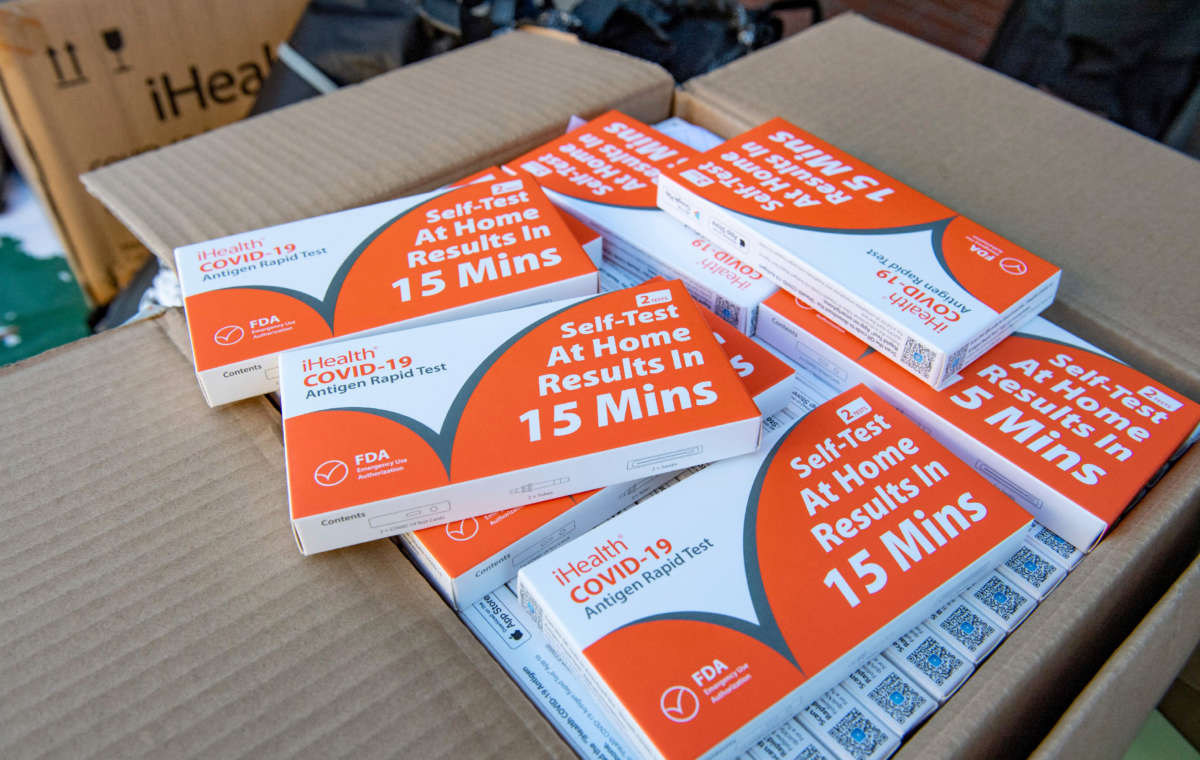Support justice-driven, accurate and transparent news — make a quick donation to Truthout today!
After mocking the idea just two weeks earlier, the Biden White House on Tuesday announced a plan to distribute 500 million free at-home coronavirus tests to households across the U.S. as the administration ramps up its effort to combat the surging Omicron variant, which now accounts for nearly 75% of the nation’s new cases.
According to a fact sheet the White House unveiled Tuesday morning, the administration will soon “purchase a half-billion at-home, rapid tests this winter to be distributed for free to Americans who want them, with the initial delivery starting in January 2022.”
“The administration will stand up a website where Americans can go to get at-home tests delivered to their home — for free,” the fact sheet notes.
The White House also said President Joe Biden will utilize the Defense Production Act to scale up the manufacturing of coronavirus tests to ensure adequate supply as demand surges in response to the spread of Omicron, which is driving a rise in infections across the country. Coronavirus cases in the U.S. are up 20% over the past two weeks and hospitalizations are up 14%, state and local health data shows.
Public health experts and campaigners welcomed the administration’s belated decision to use the apparatus of the federal government to widely distribute free at-home coronavirus tests, an approach that has long been a mainstay of other major nations’ pandemic response efforts.
“Finally they are listening!” tweeted Jeremy Faust, an emergency physician at Brigham and Women’s Hospital and an instructor at Harvard Medical School.
Uché Blackstock, a physician and health equity advocate, said the administration’s about-face demonstrates that “social media advocacy really does work.”
“Now, if only we could get these tests to folks now as opposed to sometime in January,” Blackstock added.
Earlier this month, the White House faced a wave of criticism over its dismissive response to a reporter’s suggestion that mass-mailing tests could be simpler — and more effective — than a separate administration plan allowing people to seek reimbursement from their private health insurers to cover test costs.
“Why not just make them free and give them out to — and have them available everywhere?” NPR’s Mara Liasson asked during a December 6 press briefing.
White House Press Secretary Jen Psaki responded sarcastically: “Should we just send one to every American?”
The American Prospect’s David Dayen argued after the administration’s reversal that “the teachable lesson is that the White House can be embarrassed into doing the right thing.”
“And that you don’t need Joe Manchin’s sign-off to produce for the American people,” Dayen added.
As the Washington Post’s Aaron Blake noted in response to Psaki’s comments, “It’s not like sending free tests to everyone is some unthinkable idea. The United Kingdom allows people to mail-order seven tests at a time, free of charge. Singapore has sent not one but six free rapid tests to every household.”
While lamenting that it is long overdue, epidemiologist Michael Mina said he is nevertheless “excited” about the administration’s plan, which will also attempt to increase lagging U.S. vaccination rates by establishing new pop-up clinics across the nation.
“Though to temper expectations — there’s 350 million people in the U.S. and 500 million free tests distributed over a period of months only goes so far,” Mina observed. “Although 500 million across 350 million is not massive per person, this has the ability ensure that this process is in place and the U.S. will have tests when needed beyond Omicron.”
Media that fights fascism
Truthout is funded almost entirely by readers — that’s why we can speak truth to power and cut against the mainstream narrative. But independent journalists at Truthout face mounting political repression under Trump.
We rely on your support to survive McCarthyist censorship. Please make a tax-deductible one-time or monthly donation.
